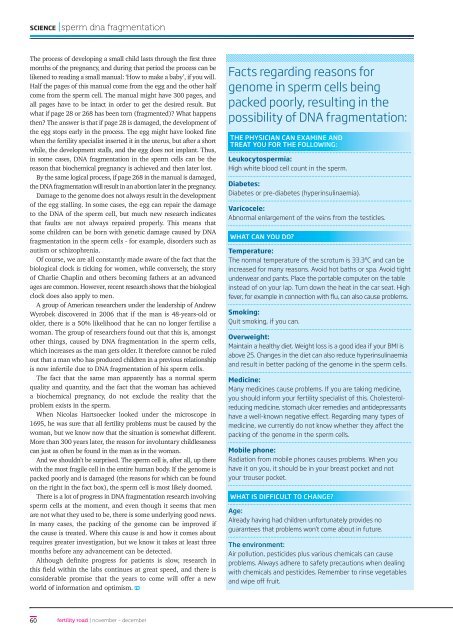Fertility Road Issue 03
You also want an ePaper? Increase the reach of your titles
YUMPU automatically turns print PDFs into web optimized ePapers that Google loves.
SCIENCE | sperm dna fragmentation<br />
The process of developing a small child lasts through the first three<br />
months of the pregnancy, and during that period the process can be<br />
likened to reading a small manual: ‘How to make a baby’, if you will.<br />
Half the pages of this manual come from the egg and the other half<br />
come from the sperm cell. The manual might have 300 pages, and<br />
all pages have to be intact in order to get the desired result. But<br />
what if page 28 or 268 has been torn (fragmented)? What happens<br />
then? The answer is that if page 28 is damaged, the development of<br />
the egg stops early in the process. The egg might have looked fine<br />
when the fertility specialist inserted it in the uterus, but after a short<br />
while, the development stalls, and the egg does not implant. Thus,<br />
in some cases, DNA fragmentation in the sperm cells can be the<br />
reason that biochemical pregnancy is achieved and then later lost.<br />
By the same logical process, if page 268 in the manual is damaged,<br />
the DNA fragmentation will result in an abortion later in the pregnancy.<br />
Damage to the genome does not always result in the development<br />
of the egg stalling. In some cases, the egg can repair the damage<br />
to the DNA of the sperm cell, but much new research indicates<br />
that faults are not always repaired properly. This means that<br />
some children can be born with genetic damage caused by DNA<br />
fragmentation in the sperm cells - for example, disorders such as<br />
autism or schizophrenia.<br />
Of course, we are all constantly made aware of the fact that the<br />
biological clock is ticking for women, while conversely, the story<br />
of Charlie Chaplin and others becoming fathers at an advanced<br />
ages are common. However, recent research shows that the biological<br />
clock does also apply to men.<br />
A group of American researchers under the leadership of Andrew<br />
Wyrobek discovered in 2006 that if the man is 48-years-old or<br />
older, there is a 50% likelihood that he can no longer fertilise a<br />
woman. The group of researchers found out that this is, amongst<br />
other things, caused by DNA fragmentation in the sperm cells,<br />
which increases as the man gets older. It therefore cannot be ruled<br />
out that a man who has produced children in a previous relationship<br />
is now infertile due to DNA fragmentation of his sperm cells.<br />
The fact that the same man apparently has a normal sperm<br />
quality and quantity, and the fact that the woman has achieved<br />
a biochemical pregnancy, do not exclude the reality that the<br />
problem exists in the sperm.<br />
When Nicolas Hartsoecker looked under the microscope in<br />
1695, he was sure that all fertility problems must be caused by the<br />
woman, but we know now that the situation is somewhat different.<br />
More than 300 years later, the reason for involuntary childlessness<br />
can just as often be found in the man as in the woman.<br />
And we shouldn’t be surprised. The sperm cell is, after all, up there<br />
with the most fragile cell in the entire human body. If the genome is<br />
packed poorly and is damaged (the reasons for which can be found<br />
on the right in the fact box), the sperm cell is most likely doomed.<br />
There is a lot of progress in DNA fragmentation research involving<br />
sperm cells at the moment, and even though it seems that men<br />
are not what they used to be, there is some underlying good news.<br />
In many cases, the packing of the genome can be improved if<br />
the cause is treated. Where this cause is and how it comes about<br />
requires greater investigation, but we know it takes at least three<br />
months before any advancement can be detected.<br />
Although definite progress for patients is slow, research in<br />
this field within the labs continues at great speed, and there is<br />
considerable promise that the years to come will offer a new<br />
world of information and optimism.<br />
Facts regarding reasons for<br />
genome in sperm cells being<br />
packed poorly, resulting in the<br />
possibility of DNA fragmentation:<br />
THE PHYSICIAN CAN EXAMINE AND<br />
TREAT YOU FOR THE FOLLOWING:<br />
Leukocytospermia:<br />
High white blood cell count in the sperm.<br />
Diabetes:<br />
Diabetes or pre-diabetes (hyperinsulinaemia).<br />
Varicocele:<br />
Abnormal enlargement of the veins from the testicles.<br />
WHAT CAN YOU DO?<br />
Temperature:<br />
The normal temperature of the scrotum is 33.3ºC and can be<br />
increased for many reasons. Avoid hot baths or spa. Avoid tight<br />
underwear and pants. Place the portable computer on the table<br />
instead of on your lap. Turn down the heat in the car seat. High<br />
fever, for example in connection with flu, can also cause problems.<br />
Smoking:<br />
Quit smoking, if you can.<br />
Overweight:<br />
Maintain a healthy diet. Weight loss is a good idea if your BMI is<br />
above 25. Changes in the diet can also reduce hyperinsulinaemia<br />
and result in better packing of the genome in the sperm cells.<br />
Medicine:<br />
Many medicines cause problems. If you are taking medicine,<br />
you should inform your fertility specialist of this. Cholesterolreducing<br />
medicine, stomach ulcer remedies and antidepressants<br />
have a well-known negative effect. Regarding many types of<br />
medicine, we currently do not know whether they affect the<br />
packing of the genome in the sperm cells.<br />
Mobile phone:<br />
Radiation from mobile phones causes problems. When you<br />
have it on you, it should be in your breast pocket and not<br />
your trouser pocket.<br />
WHAT IS DIFFICULT TO CHANGE?<br />
Age:<br />
Already having had children unfortunately provides no<br />
guarantees that problems won’t come about in future.<br />
The environment:<br />
Air pollution, pesticides plus various chemicals can cause<br />
problems. Always adhere to safety precautions when dealing<br />
with chemicals and pesticides. Remember to rinse vegetables<br />
and wipe off fruit.<br />
60 fertility road | november - december
















